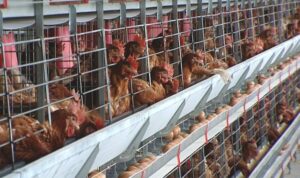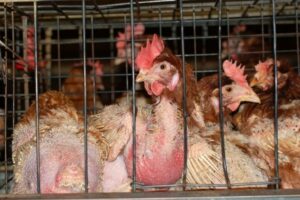Argentina is one of the Latin American countries with more companies committed to eliminating the use of eggs from caged hens, according to the international NGO Sinergia Animal. The report of the fifth edition of the Cage-Free Tracker pointed out that, during 2024, 21 out of the 47 national or internationally present companies involved in this project were able to successfully carry it out.
This report was conducted by the annual monitoring program that gathers information from companies in the food industry in Latin America, including supermarkets, cafeterias, bakeries, restaurants, catering services, hotels, and even cruises. The objective is to monitor the product, especially regarding the sourcing of cage-free eggs.
According to Cage-Free Tracker, the aim of this program is to promote animal welfare in the lives of these animals, as cages can hinder many natural behaviors of the hens.
“This year we call on different companies in the region to ensure their global commitments to cage-free policies. We want them to be implemented in all countries where they operate and also receive reports that account for their progress in Latin America,” stated Catalina Castaño, Corporate Implementation Manager of Sinergia Animal for Latin America.

What were the advances in 2024?
According to the analysis by Cage-Free Tracker, 138 companies joined the elimination of the use of eggs from caged hens, 20% more than in 2023. This demonstrates that more and more companies are committed to ensuring animal welfare. However, of the 61.59% of the companies that reported their implementation, only 49.28% did so in detail. In Argentina, less than half of the companies provided specific reports on their results in the country or the region.
“In a context of emergency for animals and for consumers, it is vital that brands ensure that their suppliers comply with good practices and report their progress transparently,” mentioned Castaño.

Looking ahead to 2025
Many companies will have until 2025 to complete the transition to cage-free eggs, a goal that is close to being achieved. The results obtained so far are encouraging: 8 out of the 83 brands have already reached the 100% goal, while 30 others reported specific progress for the region and 13 did so globally. On the other hand, a total of 32 companies still owe transparency to their consumers, as well as clarity on the implementation of their commitment.
According to Castaño, cage-free commitments are becoming more viable each year, and their challenges are increasingly manageable. Additionally, the manager added that among the main obstacles for companies are the economic crisis, rising costs, low supply of liquid eggs for retail purchases, and misleading information from some producers.
In the Latin American continent, 87% of the 610 million laying hens are still caged, a figure slightly lower than the global average of 90%. Several countries have already banned the use of caged hens for egg production, including in the European Union and several states in the United States, due to their cruelty and risks to public health.

